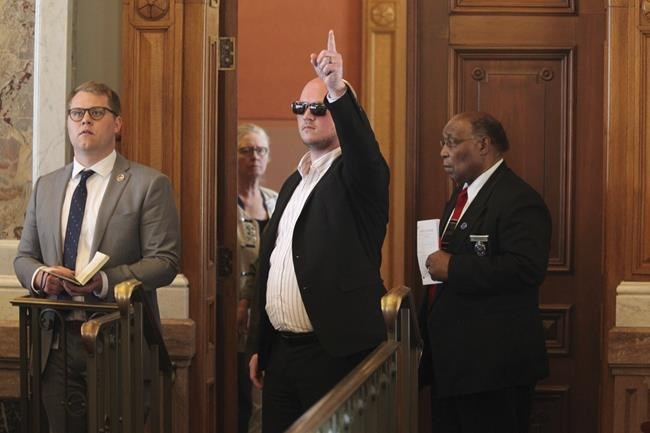TOPEKA, Kan. (AP) — Kansas health care providers could face criminal charges over accusations about their care of newborns delivered during certain abortion procedures after the Republican-controlled Legislature on Wednesday overrode Democratic Gov. Laura Kelly's veto of their legislation.
The new law takes effect July 1 and will require that heath care providers “exercise the same degree of professional skill, care and diligence” to preserve the health of newborns delivered during an abortion procedure that a “reasonably diligent and conscientious” provider would with other live births. The newborns will have to be transported to a hospital, and violating the law will be a felony, punishable up to a year’s probation for a first-time offender.
GOP lawmakers and anti-abortion groups pushed for the new rule and other anti-abortion measures even though a decisive statewide vote in August 2022 affirmed abortion rights. Abortion opponents argued that voters still left room for “reasonable” restrictions, while abortion rights lawmakers said the bills broke faith with voters.
The new measure may be largely symbolic: Providers say the cases covered by the new law rarely, if ever, occur in Kansas because of how the state already regulates abortion. But abortion rights advocates also see the law as designed to sow confusion and fear so that doctors don't want to provide abortion care and women are afraid to seek it.
“The words in these laws do not have any kind of real meaning," said Elisabeth Smith, state policy and advocacy director for the Center for Reproductive Rights, which defends access to abortion. "Doctors and hospitals and clinics that are trying to interpret them don't know what they mean and they don't know how a prosecutor or a district attorney will be reading those laws.”
The Kansas law is similar to laws in at least 18 other states requiring that such newborns go to a hospital while also imposing criminal penalties for doctors who don’t provide the same care other providers would other live births. In Montana, voters rejected a proposed “born alive” law in November 2022.
Abortion opponents argued that the new law is a commonsense measure that protects newborns. House Speaker Dan Hawkins, a Wichita Republican, said lawmakers were rebuking “the most radical in the pro-abortion movement.”
“We do have a culture of death,” said Republican state Rep. Ron Bryce, a southeastern Kansas physician. “The value of life is of the utmost importance.”
The votes on overriding Kelly's veto were 87-37 in the House and 31-9 in the Senate, with two-thirds majorities needed.
Jeanne Gawdun, who lobbies for Kansans for Life, the state's most influential anti-abortion group, said lawmakers “stood together for compassion and basic human decency.”
The new law also includes a requirement for providers to file annual reports with the state health department on infants “born alive” during abortion procedures. Like most states, Kansas doesn't collect such statistics on such cases.
In Kansas, the state Supreme Court ruled in 2019 that access to abortion is a matter of bodily autonomy and a “fundamental” right under the state constitution. The statewide vote last year rejected stripping out that protection.
___
Follow John Hanna on Twitter: https://twitter.com/apjdhanna
John Hanna, The Associated Press



